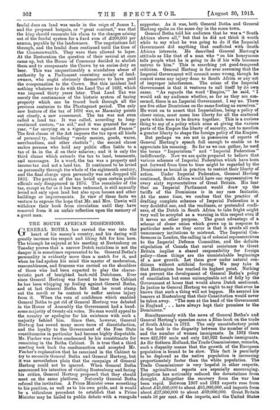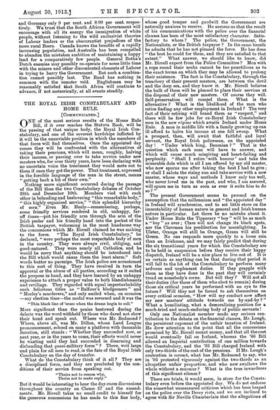THE SOUTH AFRICAN DISSENSIONS. G ENERAL BOTHA has carried the war
into the heart of his enemy's country, and his daring will greatly increase the respect and liking felt for him here. The triumph he enjoyed at his meeting at Rustenburg on Tuesday proves that a narrow Dutch racialism is not the danger it is sometimes represented to be. General Botha's personality is evidently more than a match for it, and when he bad spoken his mind this master of moderation, reasonableness, and firmness was carried on the shoulders of those who had been expected to play the charac- teristic part of benighted back-veld Dutchmen. Ever since General Hertzog was forced to leave the Cabinet he has been whipping up feeling against General Botha, and at last General Botha felt that he must stamp out the revolt or be content to suffer serious injury from it. When the vote of confidence which enabled General Botha to get rid of General Hertzog was debated in the House of Assembly the Government had a hand- some majority of twenty-six votes. No man would appeal to the country or apologize for his existence with such a majority behind him. Since then, however, General Hertzog has sowed many more tares of dissatisfaction, and the loyalty to the Government of the Free State constituencies in particular had become highly disputable. Mr. Fischer was twice condemned by his constituents for remaining in the Botha Cabinet. It is true that a third meeting took back the condemnation and accepted Mr. Fischer's explanation that he remained in the Cabinet to try to reconcile General Botha and General Hartzog, but it was nevertheless plain that the campaign of General Hertzog could not be ignored. When General Botha announced his intention of visiting Rustenburg and facing his critics, General Hertzog proposed that they should meet on the same platform. Naturally General Botha refused the invitation. A Prime Minister owes something to his position, as well as to his own pride, and it would be a ridiculous precedent to establish that a Prime Minister may be hailed to public debate with a renegade supporter. As it was, both General Botha, and General Hertzog spoke on the same day in the same town. General Botha told his audience that he was a " South African above all," but that he did not think it worth while to say what he was going to do if the Imperial Government did anything that conflicted with South African interests. He described General Hertzog's attitude as like that of a man who " on his honeymoon tells people what he is going to do . if his wife becomes untrue to him." This is searching yet good-tempered criticism. General Hertzog is for ever assuming that the Imperial Government will commit some wrong, though he cannot name any injury done to South Africa or any act of improper interference. The crime of the Imperial Government is that it ventures to call itself by its own name. "As regards the word ' Empire," he said, " I would ask my audience whether, so far as they are con- cerned, there is an Imperial Government. I say no. There are five other Dominions on the same footing as ourselves." He went on to assert that Imperialism, being a policy of closer union, must mean less liberty for all the scattered parts which were to be drawn together. This is a curious thing to say of a policy which aims at giving the various parts of the Empire the liberty of security, not to mention a greater liberty to shape the foreign policy of the Empire. But perhaps we are not in possession of reports of General Hertzog's speech full enough to enable us to appreciate his meaning. So far as we can gather, he used the terms " Imperialism " and " Imperial Federation " indifferently. Now we are quite prepared to believe that various schemes of Imperial Federation which have been put forward from time to time might be regarded by the Dominions as bound in practice to restrict their liberty of action. Under Imperial Federation, General Hertzog continued, South Africa would have one representative to every sixty representatives of Great Britain. His fear that an Imperial Parliament would draw up the tariffs of the Dominions is in any case fantastic. At the same time, we confess that the practice of drafting complete schemes of Imperial Federation is a. very doubtful one, and the readiness, or pretended readi- ness, of the Dutch in South Africa to take fright might very well be accepted as a warning in this respect even if it serves no other purpose. The great advantage of a scheme of closer union which grows up in response to particular needs as they occur is that it avoids all such unnecessary invitations to mistrust. The Imperial Con- ferences in London, the calling in of colonial representatives to the Imperial Defence Committee, and the definite stipulation of Canada that naval assistance to Great Britain implies a shared responsibility for foreign policy—these things are the unmistakable beginnings of a new growth. Let them grow under natural con- ditions without artificial forcing. We may take it that Hertzogism has reached its highest point. Nothing can prevent the development of General Botha's policy of conciliation but some unimaginable act of folly by the Government at home that would alarm Dutch sentiment. In justice to General Hertzog we ought to say that even he knows that such a thing will not happen. He assured his hearers at Rustenburg that their Constitution would never be taken away. "The men at the head of the Government in England . . . have always kept their promises to the Dominions."
Simultaneously with the news of General Botha's and General Hertzog's speeches came a Blue-book on the trade of South Africa in 1912. The only unsatisfactory point in the book is the disparity between the number of men and the number of women immigrants. In 1912 there were 422,910 male and only 240,922 female immigrants. As Sir Sothern Holland, the Trade Commissioner, remarks, such a disparity means that the growth of the European population is bound to be slow. This fact is peculiarly to be deplored as the native population is increasing proportionately faster than the white population. The Trade Commissioner is very • hopeful in other respects. The agricultural reports are especially encouraging. Irrigation has noticeably reduced the devastations from drought. Altogether the recovery from the war has been rapid. Between 1907 and 1912 exports rose from about X45,000,000 to about £61,000,000, and imports from about £27,000,000 to about £39,000,000. Great Britain sends 58 per cent. of the imports, and • the United States and Germany only 9 per cent. and 8.99 per cent. respec- tively. We trust that the South African Government will encourage with all its energy the immigration of white people, without listening to the wild exclusivist theories of Labour leaders or the obscurantist prejudices of the more rural Boers. Canada knows the benefits of a rapidly increasing population, and Australia has been compelled to abandon the mistaken ambition of maintaining a happy land for a comparatively few people. General Botha's Dutch enemies may possibly co-operate for some little time with the miners and other discontented elements of Labour in trying to harry the Government. But such a combina- tion cannot possibly last. The Rand has nothing in common with the remoter veld. Englishmen may be reasonably satisfied that South Africa will continue to advance, if not meteorically, at all events steadily.



































 Previous page
Previous page